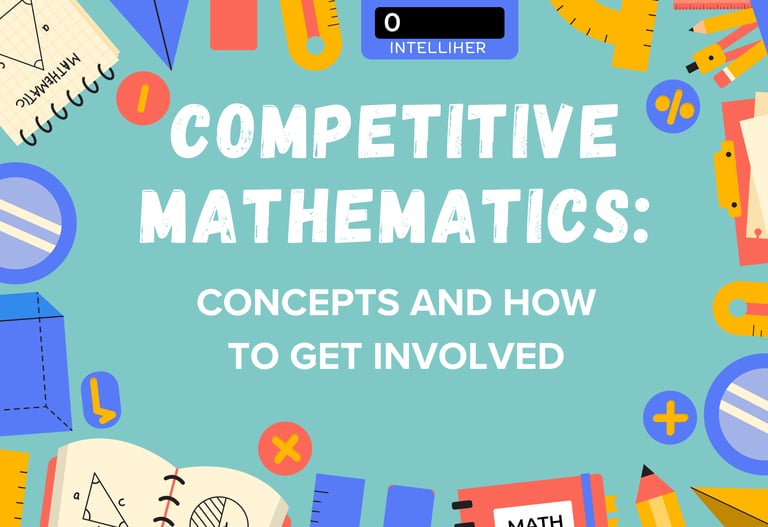Mathematics: Concepts and How to Get Involved!
Concepts, programs, and ways to apply and grow your skills!


Introduction
Math is fundamental to every day of your life. Math helps you develop multiple skills such as problem-solving, critical thinking, and time management skills. Not only this, but it also increases your scores for standardized testing, including the SAT and ACT. Taking competitive math tests also looks great on resumes and college applications if you want to pursue anything in the STEM field. If you want to get into competitive math or just want more math opportunities in general, this is the blog to look at!
We will be looking at concepts in the four categories: algebra, geometry, counting and probability, and number theory. Keep in mind that this is an introductory blog and we won’t be going into too much depth for the concepts or be going over complex concepts. However, we recommend starting with these, getting proficient with these concepts, and then moving on to harder material.
Concepts
Algebra
The first thing we are going to talk about is polynomials. You want to learn how to factor and memorize specific formulas such as the difference of squares, (a+b)^2, and (a-b)^2. The quadratic equation, quadratic formula, and Vieta's formula are all really important and all connected to each other. The quadratic formula is used to solve for solutions to the quadratic equation and Vieta's formula tells us how the solutions and quadratic equation are connected. This is fundamental and will most likely be in a lot of competitive math tests. Functional equations like f(x) = some equation, are also really important as you will most likely be trying to solve for x or the solution. Problems including sequences, specifically arithmetic and geometric, will usually ask you to solve for the difference, nth term, or the sum. You might ask: How do we even find the sequence or the sum? Well, we already have formulas such as the arithmetic and geometric series formula as well as the arithmetic and geometric sum formula. Next, you really want to know how to solve systems of equations by setting two equations equal to each other, using substitution, or using elimination. Usually, you will only encounter problems with two variables but for harder problems there will most likely be more. You should also know how time, speed, rate, and distance correlate with each other.
Geometry
Geometry is the hardest of the four categories to learn and a lot of the hardest problems come from this topic. A VERY important tip, usually when a problem contains angles, you want to figure out how to incorporate triangles into the problem, most of the time using 45-45-90 and 30-60-90 special triangles. You will definitely need to memorize the special triangles as they will show up on a lot of problems so make sure you know them. You will see a lot of problems containing areas of 2d and 3d shapes. Easier problems of an area geometry problem typically include 2d shapes such as solving for triangles and quadrilaterals. Harder problems typically include polygons with more than four sides and 3d shapes. You don’t need to know all the areas because most of the time you can just use basic 2d shapes such as triangles, squares, circles, and 3d shapes such as cubes and pyramids to find the area of an object. Of course, you can always memorize the areas of harder shapes to find the solution faster. You should know and memorize the areas of basic quadrilaterals, triangles, circles, cubes, pyramids, cones, and cylinders. You should also know the basic properties of all these shapes, it will be hard to memorize but with enough time and practice, it will sink into your mind. You should know all the properties and most theorems for quadrilaterals, triangles, and the interior angle sum for shapes. Triangles are really important so make sure you know how to use medians, perpendicular bisectors, angle bisectors, theorems for lengths, theorems for angles, and the similarity triangle theorems. Circumscribed circles are made from the perpendicular bisectors of an inscribed triangle. Inscribed circles are made from the angle bisectors of a circumscribed triangle. They also have theorems that go along with those but you only need to know the common and basic theorems.
Counting and Probability
Probability problems usually contain one of two things, factorials and combinations. Factorials are used when order matters while combinations are used when it doesn’t matter. These are the basics of probability so make sure you know these as it will only get more complicated from here. You can use Pascal's triangle to find out different combinations as well as the sum of a combination row or diagonal. Casework and Complementary counting are one of the two most basic ways to solve probability problems so I recommend learning these before you try to learn any other way. More complex ways to solve probability include sticks and stones/stars and bars as well as the principle of exclusion and inclusion and are very very helpful to know because they will be easier to use rather than casework and complementary counting. The difference between dependent and independent events is fundamental to know as one mistake could mess up the whole solution. Dependent events are when one event leads to or affects the probability of another event which means that we need to multiply the events. Independent events are when one event doesn’t affect the other at all which means that the probabilities need to be added.
Number Theory
Modular arithmetic is used to find the remainder when dividing a number by another. Prime factorization is used in a lot of different types of problems and is when prime numbers are used to make up a number. Base numbers don't show up in a lot of competitive math tests but it is an important math concept so I decided to add it. Divisibility rules are really helpful when you are trying to find a quick method of whether a number is divisible by a certain number or not. LCMs and GCDs are also really valuable and are one of the basic concepts of number theory.
COMPETITIONS (AND PRIZES!)
These are many different competitions that may get you interested in the field of mathematics. You can win many prizes by doing well in these competitions.
USA Mathematical Talent Search
The USA Mathematical Talent Search is a free contest for middle and high schoolers based in the US. Students will be given a month to write out proofs for the questions, with the aid of resources such as books, calculators, and computers. This competition gives out prizes in the end including books, t-shirts and mathematical software. Additionally, if a score of 68 or higher out of 75 is received, students are invited to participate in the American Invitational Mathematics Examination (AIME), an extremely prestigious math contest.
Math Kangaroo Competition
The Math Kangaroo Competition is a math test for elementary, middle, and high school students. For grades 1-4, the test contains 24 questions and for grades 5-12, the test has 30 questions. Each question is worth 3, 4, or 5 points depending on the type of problem. There are numerous awards and prizes for those who do well such as ribbons and medals.
MOEMS Contest
MOEMS is a national math Olympiad competition for elementary and middle schoolers. There are a total of 5 tests, each with 5 questions which you can take throughout the year. The problems on these questions are challenging and puzzle-like, and are different from those students may encounter in a classroom setting. Each school is its own team, and each team is competing against each other for an award. Those who score within the top 50%, 10% and 8% receive prizes, and the highest scorer from each team may receive a trophy/medal too.
Zoom International Math League
These monthly contests take place the first weekend of each month during the academic year. There are a total of five divisions (Division E - upper elementary, Division M - middle school, Division H - high school, Junior Varsity and Varsity). Junior Varsity is open to all age levels and is the second-highest competition division. It covers the material found on the AMC 10/12 and National Mathcounts level. Varsity is the highest competition division and covers material similar to the last 10 questions of the AMC 12 and AIME levels. All of these tests are 60 minutes long and have 20 questions each
Caribou Contests
There are 7 different grade levels possible (K/1, 2, 3/4, 5/6, 7/8, 9/10, 11/12) in the Caribou Contests. Students can only participate in their grade level or higher, but can never go lower. Every year there are 6 contests held over a span of 2 days (Wednesday and Thursday). Each exam will be 50 minutes long. Cash prizes will be awarded at the end of the year to top-performing students. For enrolling in the Caribou contests, you will either require a Coordinator (teacher, librarian, etc.) or you may self-register with the Caribou Virtual School.
MathCON Contest
The MathCON contest is one of North America’s most prestigious math competitions. Students from 4th to 12th grade residing in either the United States or Canada may participate in this contest. The competition has two rounds which includes an online test and a finals round (for the 628 top-scoring students). The final round takes place in Chicago, Illinois. You may either register for the competition through your school or individually register.
American Mathematics Competition
There are many American Mathematics Competitions. A few include the AMC 8, AMC 10, AMC 12, and AIME (American Invitational Mathematics Examination). These contests are very difficult and competitive since they are very popular. The exams generally contain challenging problems that are more puzzle-like. The AMC 8 is a 25-question, 40-minute, multiple-choice exam for middle school students. The AMC 10 and 12 are both 25-question, 75-minute, multiple-choice exams for high school students. Students who do well on the AMC 10/12 may qualify for AIME, which is an extremely selective and prestigious exam, with 15 questions over the span of 3 hours.
Berkeley Math Tournament
The Berkeley Math Tournament is a competition hosted by the college UC Berkeley. There is a Berkeley Mini Math Tournament for advanced elementary and middle school teams and a regular Berkeley Math Tournament for high school teams. The test typically has around 60 questions and is either an entire day at UC Berkeley or an entire day online usually from 10:00 AM - 5:00 PM. The goal of the math tournament is to promote teamwork, integrity, inclusion, and excellence in the field of mathematics.
INTEGIRLS Math Competitions
INTEGIRLS is a global nonprofit organization whose aim is to bridge the gender gap in mathematics. To participate in the INTEGIRLS math competitions, you must identify as a female or non-binary student. There are many different INTEGIRLS chapters throughout the world like the Bay Area, Houston, Boston, Concord, Toronto, etc. Sign up to take part in a competition at a chapter nearest to you or register for a virtual competition. INTEGIRLS offers many fun competitions, including team and individual throughout the year. They also offer online competitions as well.
Math Prize for Girls
Math Prize for Girls is an annual math competition for high school girls across the United States. To join this competition, you must apply and be accepted. This is a selective competition that is hosted at MIT, where 250 high school female students are invited to compete. Cash prizes will be given out to the top 10 best-performing students. The objective of this competition is to help bridge the gender gap in STEM education and inspire more girls to major in mathematics.
CLASSES AND TUTORING
Taking math classes is a great way to enhance your math skills. Tutoring others showcases your understanding of math concepts and that you can help others learn them as well.
Schoolhouse SAT Bootcamp
Schoolhouse offers many FREE boot camps for students taking the SAT. These boot camps help students improve their math, reading, and writing skills, leading to better test scores on the SAT. Students can sign up for specific classes based on their current score range and are assigned a tutor to help them improve their skills. If you have already taken the SAT and would like to help others, you can apply to become a tutor. You must meet all of the requirements (including having a qualifying SAT score) to become a tutor.
Khan Academy
Khan Academy is a non-profit organization that provides FREE courses and learning resources (articles, videos, and practice problems) for students. Courses range from elementary to college level in various subjects such as math, science, arts & humanities, English, and many more! These courses enhance students’ learning skills and allow them to do better in their own classes at school, and support those who are homeschooled as well.
AoPS
AoPS (Art of Problem Solving) has many courses and resources that help students advance in mathematics. AoPS classes are online and in-person at many locations. There are classes suitable for grades 1-12. The Art of Problem Solving curriculum is more advanced than school mathematics, as they want to challenge students to think through hard problems. AoPS also has many courses to prepare students for different types of math competitions, many of which were listed in this slideshow.
Dougherty Math Circle Classes
The Dougherty Math Circle’s goal is to have students learn that skill comes from enjoying math. The Dougherty Math Circle offers classes for middle school and high school students in competitive math and data science. A few classes are: Beginning Math (grades 5-6), Advanced Math (grades 7-8), and Data Science (grades 8-12). Sign up here!
MORE OPPORTUNITIES
IntelliHer hosts many workshops that provide members with opportunities in many fields of STEM, including mathematics.
Earlier this year, we hosted a math workshop that provided the above opportunities with detailed descriptions and links. Check out the workshop slides here for more information.

